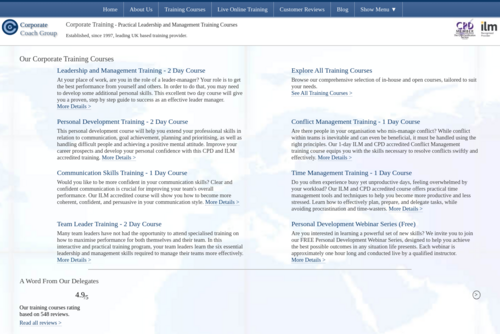How to give Constructive criticism

From http://www.corporatecoachgroup.co.uk 4175 days ago
Is it true that you need to give and take Constructive criticism?
You recognise that Constructive criticism can ideally be seen as “critical feed-back” and can be used to improve the performance of the team.
But to give constructive criticism is not an easy task:
• Most people cannot give good constructive criticism:
• Most people cannot take constructive criticism.
If you need specialised training on how to give, or take, constructive criticism….
Then please, read on………..
Who Voted for this Story
Subscribe








Comments
4174 days ago
The final criticism for poor N. was that she didn't care about her job because she didn't fight over the edits with the editor, didn't show emotion, remained calm, didn't get angry.
What I learned from your article and comment is this: As an employer, I need to be aware that when I give criticism it may be perceived in the context of my employee's total work experience...and I have to be cognizant of that experience..and be direct, not hedge about with implications.
This may not be what you wanted us to learn, but it's still pretty good, so thanks!
4174 days ago
This is just an example of how common sense reactions don't always work, and how there are holes in this kind of advice, no matter how good it seems.
4173 days ago
I agree with you on this point: critical feedback should be clear, explicit, objective and factual.
Then the message will not be missed or misunderstood.
In this case the employer seemed to make the criticism explicit but their implications too implicit and therefore message was missed or misunderstood; with bad consequences for all sides.
Regards Chris
4174 days ago
Here is my reply:
Your colleague failed to follow the success formula
Purpose; plan; action; critical feedback and CHANGE!
I.e. If the writer was continually being edited, then there must have been continuous errors in style, content or both. These errors would have been of a similar type, that she was repeating in numerous instances, over a period of weeks and months,. The errors were as a result of habit patterns of thought and self-expression.
BUT the writer failed to mentally identify the class of error, or errors, that the continued edits were alluding to.
As a result of failing to identify the classes of error, in the form of an explicitly stated principle or concept, she continued to repeat the same or similar mistakes. I.e. she did not learn the abstract lessons, contained in the edits. Instead she simply carried on as she had done, without making evolutionary changes to her technique.
So you are right in some things that you say; but wrong in others.
You said that there is no perfect way to react to criticism. That’s right because perfection is not possible.
You said that “She might have been better off reacting more aggressively, to "show she cared". Dead wrong!
The rule is “treat people and problems according to the principles of reason”
The main error is not that your writer failed to get aggressive, but rather; she failed to learn from her repeated mistakes and make the necessary changes
(Success formula step 4 and 5).
4175 days ago
Thank for pointing out the success formula:
1. Purpose.
2. Plan.
3. Action.
4. Feed-back. (Positive, and negative feed-back)
5. Change.
I like that you have the option to listen to your post! :)